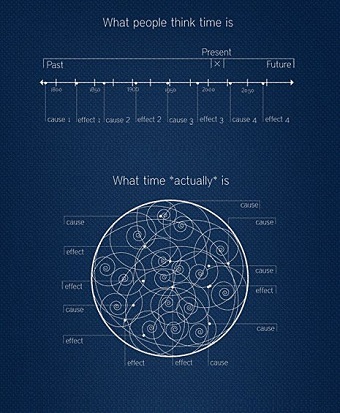SCIENCE & TECHNOLOGY
Time and Determinism
By Dr. Christopher Plumberg

So how should a Christian respond to these claims? Is it true that physics has debunked the notion of free will? Any attempt to sort through the thoughts of current academics on the nature of physics, time and free will is bound to become convoluted quickly. It's important to note that most of these ideas are not required by the laws of physics, but can (presumably) be made to be consistent with any and all known physics (e.g., Einstein's theory of relativity). This is therefore primarily a philosophical discussion, and a highly speculative one at that. Moreover, Scripture never speaks unambiguously to exactly the nature of time or how this relates to human beings and their apparent freedom to act as they please, so we should approach this topic with both caution and humility.
Let's discuss first what Scripture does tell us about these issues. First, the Bible is replete with instances of God commanding people to do one thing or another. The Ten Commandments alone are obviously instructions in this sense, and would be virtually meaningless if we possessed utterly no freedom to either obey or disobey them. There must, therefore, be some sense in which the freedom to choose is available to the human beings God has created in His image (cf. Genesis 1:26). Although this freedom is not absolute — that is, it necessarily does not violate or contradict the sovereignty of God in any way (cf. Psalm 103:19) — it is nevertheless an essential aspect of our ability to choose either to obey or to disobey God's commands, and subsequently to be held accountable for these choices. Scripture therefore requires us to believe in some kind of freedom of the human will, even if this freedom is not absolute.
Of course, we also read in Scripture that God declares "the end of from the beginning" (Isaiah 46:10, NASB). Does God's knowledge of the future remove our ability to choose freely? In short, not necessarily. God does not have to dictate our choices in order to be sovereign, nor must our choices be completely self-determined (in an ultimate sense) to be regarded as free. There is a great deal of intense debate within the Church on this issue and the right way of reconciling our perceived freedom to choose and God's sovereignty over His creation, but the essential conclusions that we must have based on Scripture are that (1), people are responsible for their choices and can be justly rewarded or punished by God for them, and (2), God has total knowledge of and sovereignty over every aspect of His creation. As long as we hold to these two truths, we can have confidence that our speculation about time, physics and free will is within the bounds of Biblical teachings.
This automatically enables us to discard certain philosophical theories of time and physics which do not affirm these truths. There are several different theories of free-will/determinism on the market. Some of these theories believe free-will and determinism to be mutually contradictory, while others do not. Those who believe that free will and determinism are contradictory split into two primary camps: those who accept free will and reject determinism, and those who accept determinism and reject free will. Depending on the definitions of free will and determinism which are used, Biblical theology is probably somewhere between these two extremes.
On the other hand, there are also those who do not believe that free will and determinism are mutually contradictory, but rather reject free will and refuse to take a stance on determinism at all. Consequently, folks in this category would probably say that they do not believe in free will, and would further argue that this does not commit them to a position on determinism. The essential idea of this view appears to be that, if one accepts naturalism, then within the parameters of the laws of quantum physics, nothing ever happens with absolute certainty, but only with a certain calculable probability. Since the outcome of any given experiment is undetermined by the initial conditions of the experiment, it is difficult to see how there can be any complete determination of any given event on any basis, free will or otherwise.
Of course, as I've already noted, most of this is philosophical speculation, and shouldn't prove to be terribly persuasive or disturbing. Most of these views require support from assumptions such as the truth of naturalism, particular views of quantum mechanics, and so on. Physics itself does not require us to accept one view or the other, and those who would favor one view over the other are necessarily influenced by more than just the scientific data. Science certainly has not debunked the concept of free will, at least as it is defined by what we read in Scripture.
In addition, there is not anything that is clearly wrong with saying that God knows we will freely make certain choices in the future; simply the fact that He knows of those choices does not appear to have anything to do with whether He plans to cause them. [See: "Is our will really free?"] In order to be consistent with the doctrine of God's sovereignty, it is probably sufficient to say that God allows our decisions to be freely made and knows about them fully ahead of time. This seems to leave God completely sovereign, and yet man fully responsible for his actions, and therefore probably makes the best sense of Scripture.
Image Credit: WHardcastle; "Timey Wimey Wibbly Wobbly"; Creative Commons
Tags: Biblical-Truth | God-Father | Science-Creation
comments powered by Disqus
Published 5-4-2015

